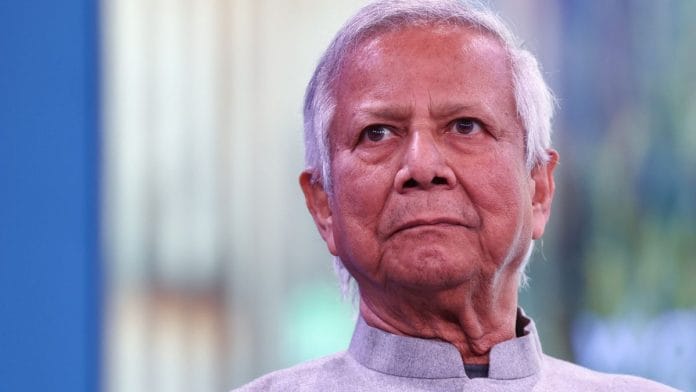Among the 54 terrorists killed by Pakistani security forces in the last week of April in North Waziristan district was a Bangladeshi national, Ahmed Zobaer, who had migrated to Afghanistan via Saudi Arabia.
The Dissent, a Bangladeshi digital outlet, reported that Zobaer was a member of Tehrik-e-Taliban Pakistan (TTP). It added that at least eight Bangladeshi nationals are currently active in Afghanistan as TTP members. The outlet spoke to Zobaer’s friend, Saifullah, who manages the social media presence for TTP’s Bangladesh chapter from Afghanistan.
What’s shocking is that Bangladesh’s security establishment remains oblivious to these developments. Authorities have no idea how many units comprising Bangladeshi nationals are operating in Afghanistan, nor do they seem aware of terrorist networks operating within Bangladesh itself.
Yet, Bangladeshis are no strangers to terrorism. In November 2005, members of Jamaat-ul-Mujahideen Bangladesh (JMB) etched their names in history by launching the country’s first suicide attacks. They targeted court buildings in the Gazipur and Chittagong districts.
These attacks occurred under the coalition government led by the centre-right Bangladesh Nationalist Party (BNP). Two senior Jamaat leaders held important portfolios during Khaleda Zia’s last term in office.
Also read: Dhaka walls have Islamist Hizbut Tahrir posters. They are asking the military to take over
A culture of denial
Most senior JMB leaders—whose group has been designated a terrorist organisation by major global powers, including India—have since been executed. But that hasn’t deterred some Bangladeshis from flirting with Islamic extremism. Like the mythical hydra that grows two heads when one is cut off, the scourge of terrorism has refused to go away. It even witnessed a resurgence with the rise of the so-called Islamic State (ISIS) in 2014.
It is estimated that at least 50 Bangladeshi nationals travelled to Syria to join and fight for ISIS, with some reports suggesting the number could exceed one hundred. Among them, several—including prominent recruiters—have been apprehended or are currently in detention. Others were killed in Syria, while some returned to Bangladesh, where they now face legal proceedings.
Bangladeshi extremists have also operated beyond Syria. In May 2016, Singapore’s Ministry of Home Affairs announced the detention of eight Bangladeshis for setting up a “clandestine group” called “Islamic State in Bangladesh.” Their aim was to establish an Islamic state back home under ISIS’s self-declared caliphate.
Despite all this, Prime Minister Sheikh Hasina and her government consistently refused to acknowledge ISIS’s presence in Bangladesh—even after the group claimed responsibility for a series of deadly attacks. Hasina maintained that these were driven by internal factors, not international terrorist networks.
This culture of denial persisted even after five gunmen stormed a popular café in Dhaka’s diplomatic enclave in 2016, killing 22 people, including nine Italians and seven Japanese. Instead of confronting the extremist threat head-on, Hasina focused on suppressing the opposition and occasionally pandered to right-wing elements in society. Fortunately, the appeal of violent fanaticism diminished following the collapse of ISIS in Syria.
Also read: Muhammad Yunus wants women’s rights in Bangladesh. First rein in Islamic radicals
The resurgence of the extreme right
However, terrorism is once again gaining traction among Bangladeshi youth—especially after the US withdrawal from Afghanistan and the Taliban’s return to power in Kabul. It reached its peak when Hay’at Tahrir al-Sham, an Al-Qaeda-linked group, took control of Damascus earlier this year.
This event occurred just five months after a Gen-Z-led uprising toppled Sheikh Hasina’s government in a bloody mass movement. Emboldened by developments in Syria, Al-Qaeda sympathisers in Bangladesh are now trying to flex their muscles. Some have even called on Chief Adviser Muhammad Yunus to convert to Islam. Women have been beaten up for wearing certain types of clothing. A group of prominent clerics has hurled misogynistic abuse at female politicians.
Making matters even more grievous is the return of Mufti Jasimuddin Rahmani. Previously jailed for inciting extremism and identified by the US-based Counter Extremism Project as a follower of Al-Qaeda ideologue Anwar al-Awlaki, Rahmani was released following Hasina’s fall.
He recently participated in a public rally calling for a ban on the Awami League. Flanked by supporters, he led roadside prayers and delivered incendiary speeches.
A senior government official told a Bangladeshi outlet that Rahmani’s release had been discussed in bilateral meetings with high-ranking US officials. Yet, he still walks free.
Incompetence galore
Bangladesh’s Home Minister is widely perceived as incompetent and is regularly ridiculed on social media. Law and order remain unstable, and there is little evidence that the government has effective mechanisms to monitor or counter extremist groups. In such environments, extremist elements always try to fill the vacuum left by the absence of a healthy political space.
To make matters worse, Bangladesh has a significant youth bulge—the median age is just 26. In this context, the involvement of young Bangladeshis in TTP’s activities in Afghanistan must be taken seriously.
Yet, the Bangladesh government has issued no statement on the death of its citizen in one of South Asia’s most restive regions. Nor has it commented on the presence of Bangladeshi extremists in Afghanistan. We still don’t know how many such cells—or worse, how many recruiters—are operating inside Bangladesh.
The Yunus government must urgently focus on this growing threat. If left unaddressed, it could snowball into a full-blown crisis and drag the country back to the gory days of suicide bombings.
Ahmede Hussain is a Bangladeshi writer and journalist. He is the editor of ‘The New Anthem: The Subcontinent in Its Own Words’ (Tranquebar Press; Delhi). He has just finished writing his first novel. He tweets @ahmedehussain. Views are personal.
(Edited by Prashant)







What is so alarming about this development?
Bangladesh, in spirit, symbolises Jinnah’s vision of an Islamic nation. Mujib tried to steer it away from such communal politics and usher in a secular society with a modern and scientific outlook towards life. Unfortunately, he and his daughter, Sheikh Hasina, failed.
The recent India-Pakistan conflict was an eye opener for us Indians. Pretty much all of Bangladeshi media shamelessly supported the Pakistanis.